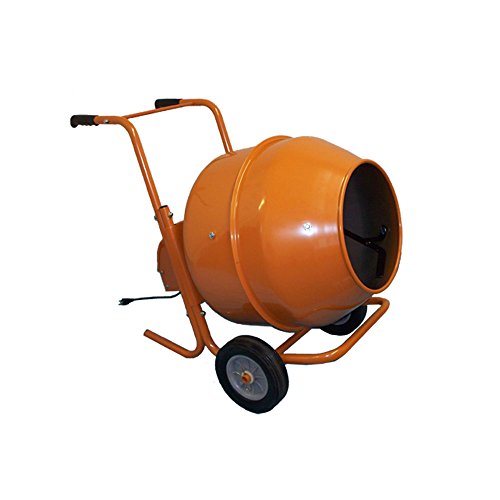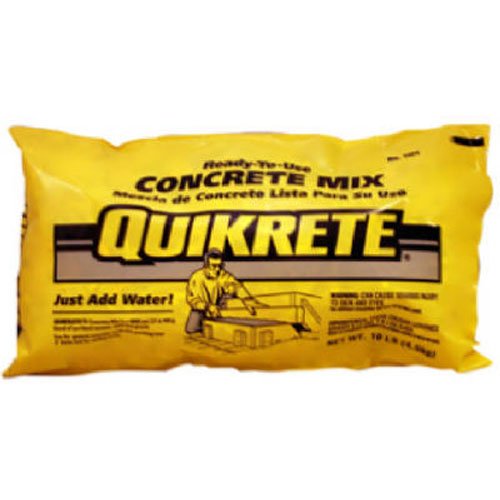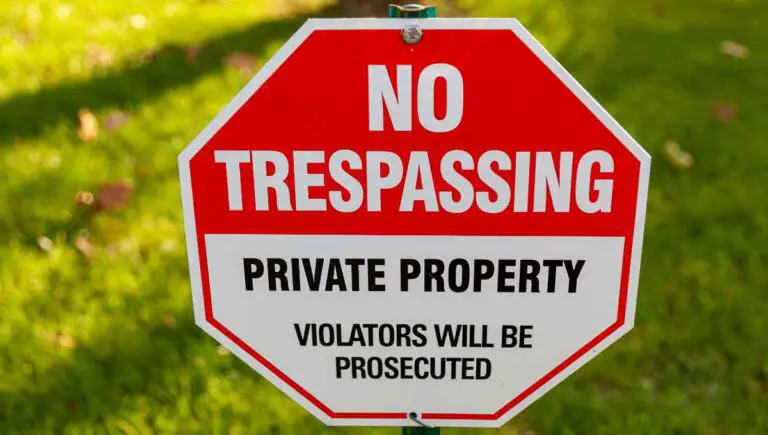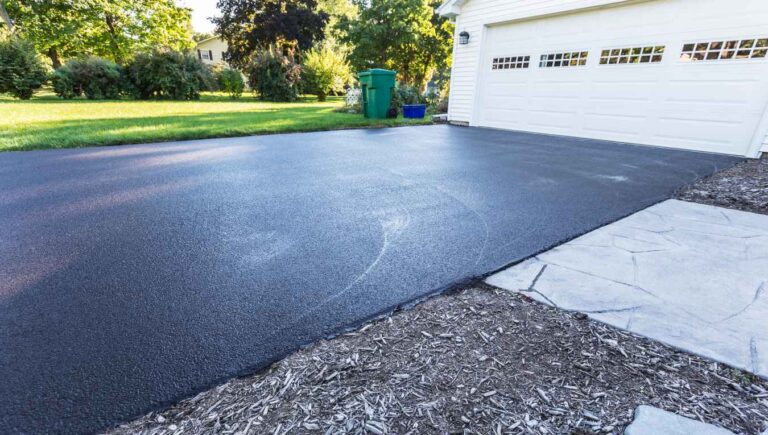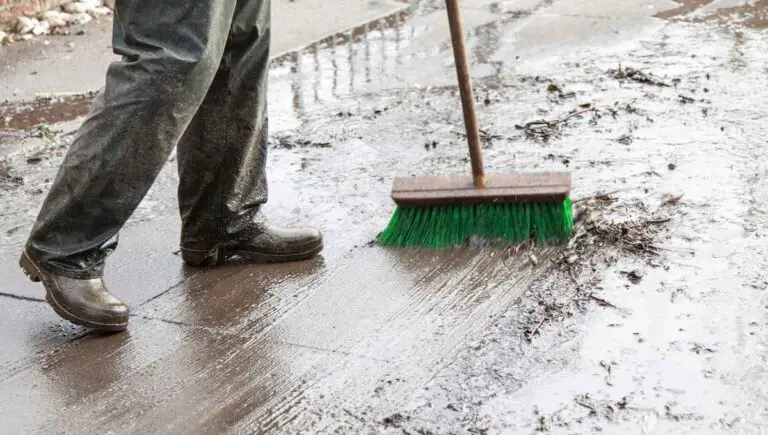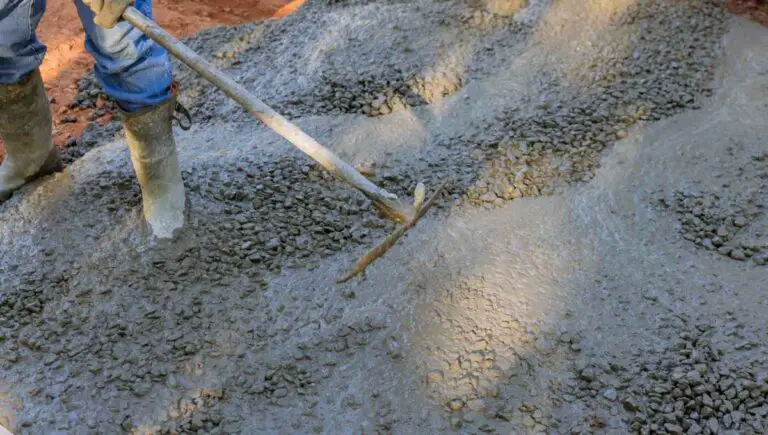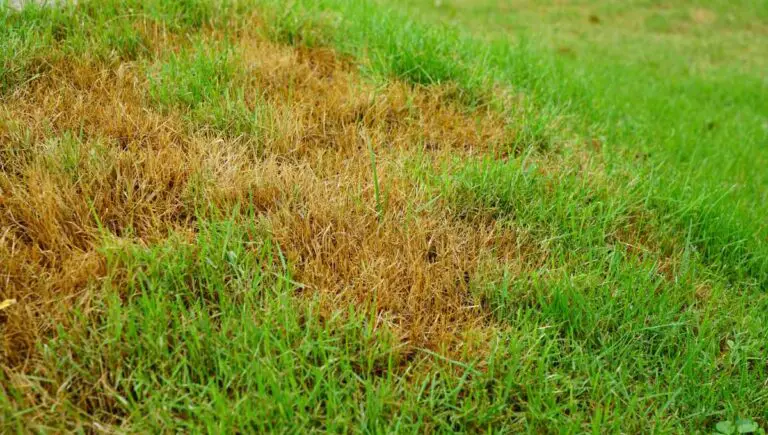Can You Pave a Driveway in the Winter? (Is It Too Cold?)
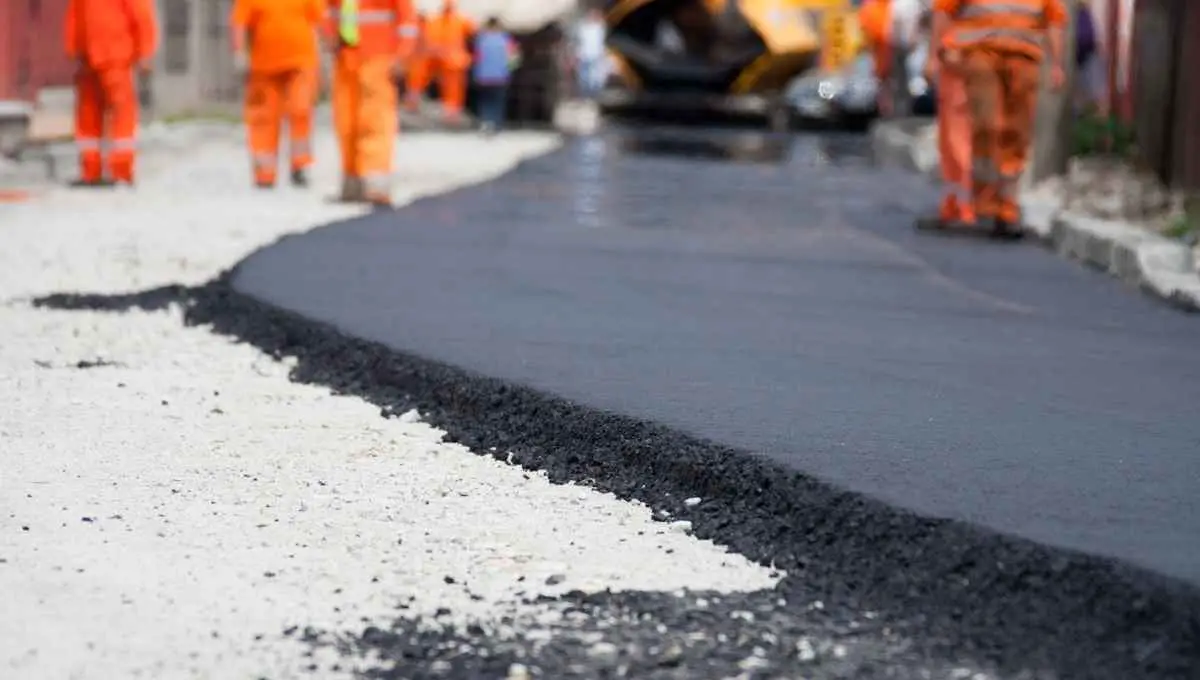
Wanting to pave your driveway in the winter may seem like a good idea because at least you can beat the summer heat, not to mention the humidity that may prevent the asphalt from drying. But, is it really a good idea to pave your driveway in the winter?
You can’t pave an asphalt driveway in winter because it won’t set properly and will suffer serious damage that may need immediate fixing. However, laying concrete can take place during winter if it follows established guidelines to protect it from external elements.
With that being said, there are details you must know to understand these matters fully. So, in this article, we took the challenge of answering the most common questions regarding the coldest temperature at which you can pave a driveway and what other weather conditions you must avoid to ensure optimal paving results.
This post contains affiliate links from Amazon and other stores. This means Yard Blogger may earn a commission if you make a purchase using any of our links. Please refer to our full affiliate disclosure policy for full details.
Here’s a Quick Pro Tip!
You can’t lay asphalt in winter, but you can do so with concrete. However, remember that you can’t lay concrete when the temperature is below 40 degrees Fahrenheit. With that said, it’s better to wait for spring to avoid the many risks.
These items can aid you with laying concrete on your driveway the next time you’re ready to pave:
1. Fast-Setting Concrete Mix – The quicker it sets, the better it gets.
2. Ground Thawing Blanket – Thaw before you pour to ensure your driveway is at its best.
3. Concrete Mixer – A perfect tool to mix concrete for your next big project.
Weather Concerns
How well paving your driveway turns out is often determined by the circumstances in which it was paved. Often, unfortunate situations occur because of bad weather. So, let’s discuss all the weather concerns below.
How Cold Is Too Cold to Pave a Driveway?
The coldest temperature at which you can pave a driveway is 50 degrees Fahrenheit. The temperature should not go below that because it may affect the compacting process that asphalt needs to set properly.
If asphalt doesn’t set properly, it is prone to suffer cracks and similar damage. Hence, the final result won’t be as satisfying as expected and will be costly to fix. Usually, cold-patch asphalt can do the trick temporarily.
Can You Pave a Driveway in Cold Weather?
Paving a driveway in cold weather is not ideal since the asphalt must be set in a balanced temperature range from 50 to 90 degrees Fahrenheit. That way, the asphalt will compact in an equilibrated way, giving you a much-desired result.
Asphalt exposed to extremely cold temperatures will freeze, resulting in cracks and unwanted holes once the snow melts.
Other complications involve an improper compacting process, which can also cause damage to the ending results.
What Time of Year Is Best to Pave a Driveway?
The best times of the year to pave a driveway are between the mid-spring and summer months since the temperature during these seasons is favorable for asphalt. Asphalt needs to be around 70 degrees Fahrenheit to set well.
Therefore, it’s best to avoid laying asphalt during the winter season. It’s complicated and won’t allow the asphalt to dry well.
Days with heavy winds or rain are also unfavorable because the asphalt can cool much quicker than expected, leading to cracks and other misfortunes.
Can You Pour a Driveway With Snow on It?
It’s not ideal to pour concrete or asphalt on a driveway with snow on it since neither of them will set properly, and the moisture will damage their structure once it dries in warmer weather. Thus, you should avoid paving your driveway during cold temperatures.
In fact, if you have contractors suggesting making your driveway in the winter season, don’t allow them to do so.
Both asphalt and concrete need a balance of warm temperatures with high humidity levels. Without them, they won’t be able to set and dry properly.
How Warm Does It Have to Be to Pave a Driveway?
It’s recommended to wait for temperatures that range from 65 degrees to 75 degrees Fahrenheit to be able to pave a driveway, which is ideal because it lets the asphalt cool at the right pace. Unfortunately, the asphalt can’t set correctly in extreme temperatures.
Asphalt exposed to high temperatures can melt or simply not cure at an adequate rate. Likewise, the asphalt may freeze and have cracked if the temperature is too cold.
This shows us that a balanced temperature is key to proper asphalt pavement.
What Temperature Should It Be to Patch a Driveway?
The adequate temperature in which you should patch a driveway ranges between 50 to 90 degrees Fahrenheit and not warmer nor colder than that. Extreme temperatures are not convenient for asphalt because they would cause further complications.
The types of complications you would encounter with asphalt damaged by extreme weather would be cracks, bumps, and overall breakage.
Since the asphalt wasn’t able to set correctly, it would start breaking off ahead of time, and it would need to be redone or temporarily fixed.
You can fix damaged asphalt with either asphalt fillers or patches. Just ensure that the one you choose is of good quality so that this fix can last for a long time, or at least until you decide to redo your driveway.
Laying Asphalt
Laying asphalt is a delicate process, especially when choosing the perfect day when the correct balance of heat and humidity occurs.
However, things can go downhill if the temperature is below what’s recommended. So, let’s discuss what happens to asphalt during winter.
Can You Lay Asphalt in Freezing Weather?
Cold temperatures will cause hot-mix asphalt issues with compacting. Thus, it’s not recommended to lay it during freezing weather. However, you can use cold-mix asphalt to repair potholes on your driveway.
Cold-mixed asphalt is mostly used to repair minor damages on asphalt driveways, so it is a good option to consider if you believe your driveway needs immediate repair.
You can choose to re-do your asphalt driveway, but you’d have to wait for warmer seasons.
Hot-mix asphalt needs warmth to compact adequately. If it doesn’t compact correctly, the quality of the asphalt will decrease and hence will suffer damage ahead of time.
Therefore, it’s important to understand this issue well.
Can You Start Asphalt Paving in Winter?
Asphalt paving in winter is not feasible due to the weather not being appropriate for asphalt compaction, which can lead to an uneven and troublesome finishing product. Therefore, ensuring balanced weather is essential for paving a new driveway.
Asphalt is likely to cool faster during cold temperatures, which is not convenient because it won’t give it time to compact correctly.
Since it won’t compact correctly, it will also suffer damages ahead of time, making you likely to do the project all over again.
Generally, pavement companies shut down during the winter and don’t open until mid-spring, when the weather is more likely favorable for work.
Although, this affliction does not necessarily occur in warmer states of the country.
How Long Does It Take Asphalt to Cure in Cold Weather?
In cold weather, asphalt takes longer to cure than average, around six to 12 months of curation. In addition, cold weather does not let asphalt set properly and can even cause it to break, leaving cracks and potholes behind.
Therefore, many paving companies suggest avoiding starting a paving project during colder seasons. Instead, it is preferable to start your project during a much warmer time, such as summer or spring.
How Long Does It Take Asphalt to Cure?
Asphalt takes six to 12 months to cure, so it is important to lay it in fair weather. In addition, asphalt needs a correct amount of heat and humidity so that the oils from the mix can oxidate.
Whether asphalt cures longer or shorter than that estimate depends mostly on how the asphalt was mixed and in what conditions it was laid.
Unfavorable weather conditions, such as rainy or snowy days, can lead to bad paving results.
Does Asphalt Need It to Be Hot Out?
While it’s recommended to lay asphalt at temperatures ranging from 50 to 90 degrees Fahrenheit, asphalt can’t tolerate extreme heat. Extreme heat can cause the asphalt to expand and contract, and the constant movement may cause it to crack.
So, while hot weather is more favorable, it should also be balanced. For example, you can’t use asphalt on heat above 90 degrees because of the issues it causes.
From this, we can learn that the temperature must be at an adequate balance between 50 and 90 degrees, no more and no less.
What Are the Asphalt Paving Temperature Requirements?
Asphalt paving temperature requirements include laying the asphalt on warm temperatures, and you should mix that asphalt at around 220 degrees Fahrenheit. The latter is why the ground should be warm and the humidity should be low.
If the weather is cold, it is difficult for contractors to spread the asphalt evenly because it would harden quickly.
Therefore, this application would leave lumps and other unnecessary cracks within the asphalt structures.
However, something similar happens when the weather is too hot. Heat softens the asphalt, which is why it is prone to damage caused by weight and other external elements.
Can You Get Snow on Your New Asphalt Driveway?
It’s not recommended to leave snow on your new asphalt driveway because of the damage it could cause once it melts. Thus, it would be best if you planned to seal coat your asphalt before it suffers any of these damages.
Snow and asphalt can’t mix. Therefore, if the asphalt is not sealed properly, it will probably cause it to expand and crack, leaving potholes and other types of damage behind.
Moreover, it could also affect the structure of the new driveway, which is tedious to fix.
This is why it is important to seal your asphalt after six to 12 months since it was first paved.
The sealing coats provided for these driveways help battle against external elements to avoid the damages they cause. Therefore, this step is important.
Pouring Concrete
Asphalt and concrete are two different things, so it is not surprising that they are both set at different rates. However, unlike asphalt, you can pave concrete in winter if it follows specific rules.
Let’s discuss all things about pouring concrete below.
Can You Pour a Concrete Driveway in Winter?
It’s possible to pour a concrete driveway during winter, but its application process should be more strict due to the nature of the weather. Concrete must be poured at above 40 degrees Fahrenheit and followed by heating mechanisms.
Once the concrete is poured, you have to ensure that the concrete is protected from weather elements. You’d have to use an insulating blanket or another heating tool to ensure enough warmth for it to harden.
If concrete isn’t protected from outside elements, you risk freezing it, which can become a problem. Concrete can crack if it freezes, as the low temperatures will cause it to expand.
How Cold Is Too Cold for Concrete?
Even though 40 degrees Fahrenheit is the lowest temperature at which concrete can be poured, the ideal temperatures range from 60 to 50 degrees. These temperatures help concrete set due to chemical reactions that help strengthen it.
If the temperatures are below what’s ideal or standard, there is a high chance that the concrete may become affected.
If concrete is too cold, it won’t harden quickly enough, so you won’t be able to use it until there are more suitable temperatures.
Moreover, concrete could lose strength if the temperatures are too low, making it prone to cracking and other similar damages.
Therefore, it should be protected with a heating mechanism if the temperature gets lower.
Can You Set Concrete in the Snow?
Setting concrete in the snow can bring a lot of problems to the concrete, which is best to avoid at all costs. It is better to thaw frozen ground before attempting to pour the concrete because not doing can result in weak concrete.
You can use many tools to thaw the frozen or snowy ground, like heating blankets. The latter provides more efficient thawing than other tools. However, if you want only to provide a small heat level, an insulation blanket will do.
What Happens if Concrete Freezes Before It Cures?
If concrete freezes before it cures, it will lose the strength it needs to support its structure, resulting in cracks. This happens because the concrete can expand in freezing weather, hence why it is important to protect it while applying it.
This is why many contractors have to go above and beyond when mixing concrete. This means they must take extra measures to ensure the cement does not freeze once it hits the ground.
One way contractors do this is by mixing the concrete with hot water instead of cold or room-temperature water.
They also increase the quantity of cement it needs during cold weather and add less water.
Can You Pour Concrete on Frozen Ground?
You should avoid pouring concrete on frozen ground because of the damage it can cause to the cement due to its reaction to freezing weather. In addition, concrete may expand and contract due to cold temperatures, which can lead to cracking.
Concrete has to undergo a process of hydration, and freezing temperatures are not convenient for it. However, extremely hot temperatures also pose some risks.
Either case can cause the cement to break off ahead of time, which causes cracks and structural weakening.
Related Questions
Can You Pave on Wet Ground?
Paving on wet ground is not recommended because the asphalt has oils that repel water. As a result, asphalt cannot be set properly and can get cracks and potholes from this improper application.
Thus, many asphalt paving companies avoid laying asphalt in rainy weather. If not, likely, the asphalt won’t be stable, causing you to need to fix it again.
Does Rain Ruin Fresh Asphalt?
Rain can ruin fresh asphalt because of the reaction it provokes since it causes the oils from the asphalt to rise to the surface, making it vulnerable to cracks and potholes. Therefore, contractors avoid laying asphalt during rainy weather.
If asphalt suffers heavy damage and cannot remain stable, you’d likely need to fix it. Unfortunately, the only way to do this is to re-lay the asphalt, which can be more expensive long-term.
Is It Better to Pave or Concrete a Driveway?
Concerning durability, concrete is better than asphalt because it lasts longer, although its maintenance is more expensive. However, whether you should pave or concrete your driveway depends on your lifestyle and expectations.
Concrete is your best option if you want something that you can customize to your liking and that lasts longer. The only issue with it is how costly maintaining it is. It will take more time and tools to fix if it cracks or suffers damage.
However, asphalt can be better for areas prone to hot weather all year round. It is also less costly and can be easily repaired, which is why it will be better for you if you are looking for a cheaper option.
Final Thoughts
It’s not convenient to pave your driveway during the winter. Asphalt can suffer damage from freezing weather, so it won’t have enough stability and will crack and have potholes.
On the other hand, concrete can be poured in cold weather, but you have to protect it with a heating mechanism that allows it to have enough heat for it to harden.
It will take longer to harden and lose its strength if not protected.


